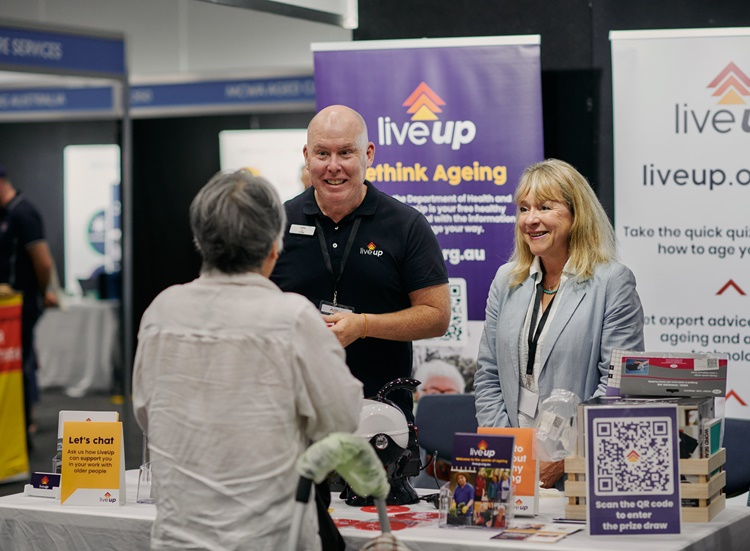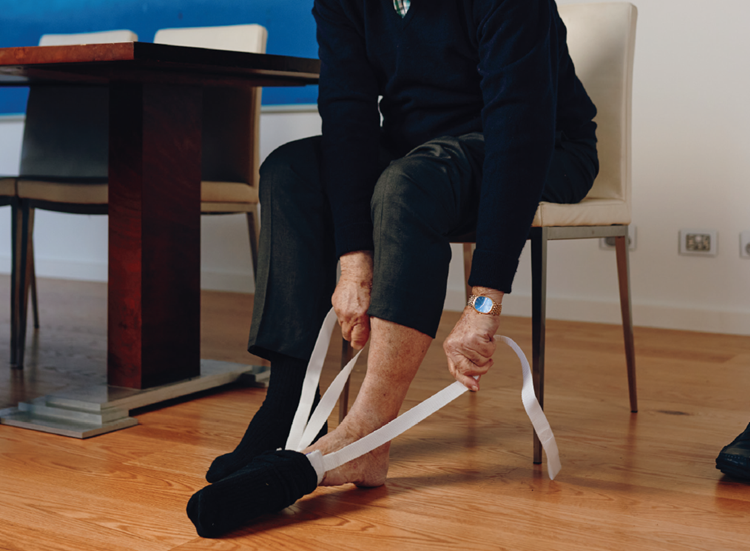Share your results
Please enter your email
Results shared!
We've sent a link to your email so you can access your results at any time.
Be aware of the rights afforded to you as a consumer of aged care and of goods and services in Australia.

As you age, your human rights do not diminish. You maintain the right to privacy, self-determination, safety, dignity, and respect. And you maintain rights as a consumer when receiving goods and services in Australia.
It’s important to be aware of the laws surrounding how you should be treated. In Australia, around 1 in 6 older people experienced elder abuse in 2020, and only one third sought help. But if you familiarise yourself with your rights, you can better protect them.
Are you a potential consumer of assistive technology, aged care, or NDIS supports and services? Here's some information you should know.
As you age, your human rights do not diminish. You maintain the right to privacy, self-determination, safety, dignity, and respect. And you maintain rights as a consumer when receiving goods and services in Australia.
It’s important to be aware of the laws surrounding how you should be treated. In Australia, around 1 in 6 older people experienced elder abuse in 2020, and only one third sought help. But if you familiarise yourself with your rights, you can better protect them.
Are you a potential consumer of assistive technology, aged care, or NDIS supports and services? Here's some information you should know.
Read less...
If you're an NDIS participant, you should know what rights you have as a consumer of NDIS funded supports and services. And if you're receiving aged care, you should know the Quality Standards your care must meet.
As a human being, you have rights to freedom of expression and self-determination. You must be allowed to make informed decisions about what services you wish to receive. Your service provider must communicate with you about the services they are offering. And they must respect your choices on the matter.
In fact, this is an element of both the Code of Conduct for Aged Care and the NDIS Code of Conduct.
If you're an NDIS participant, you should know what rights you have as a consumer of NDIS funded supports and services. And if you're receiving aged care, you should know the Quality Standards your care must meet.
As a human being, you have rights to freedom of expression and self-determination. You must be allowed to make informed decisions about what services you wish to receive. Your service provider must communicate with you about the services they are offering. And they must respect your choices on the matter.
In fact, this is an element of both the Code of Conduct for Aged Care and the NDIS Code of Conduct.
Read less...
You have the right to privacy. Your provider must not give out your information without your informed consent. However, aged care workers must report when significant harm occurs to a consumer.
You have the right to choose your workers and providers. And they must provide your supports and services with care and skill, in a safe and competent manner.
You have the right to safety. This means freedom from violence, exploitation, neglect, abuse, and sexual misconduct.
You have the right to privacy. Your provider must not give out your information without your informed consent. However, aged care workers must report when significant harm occurs to a consumer.
You have the right to choose your workers and providers. And they must provide your supports and services with care and skill, in a safe and competent manner.
You have the right to safety. This means freedom from violence, exploitation, neglect, abuse, and sexual misconduct.
Read less...
The Code of Conduct for Aged Care applies to approved providers of residential and home care and flexible care services. It doesn't apply to the CHSP, NATSIFACP, or to tradespeople not engaged by an approved provider. But these providers must still give safe and respectful care in keeping with the Code. It's your right to receive safe, respectful, and enjoyable aged care.
The NDIS Code of Conduct applies to registered and unregistered NDIS providers and NDIA community partners. It also applies to providers delivering the following:
The Code of Conduct for Aged Care applies to approved providers of residential and home care and flexible care services. It doesn't apply to the CHSP, NATSIFACP, or to tradespeople not engaged by an approved provider. But these providers must still give safe and respectful care in keeping with the Code. It's your right to receive safe, respectful, and enjoyable aged care.
The NDIS Code of Conduct applies to registered and unregistered NDIS providers and NDIA community partners. It also applies to providers delivering the following:

You should be able to talk to your provider if you're not happy with your supports or services. But sometimes, this may not solve your problem, or it may not feel safe to do.
In that case, you can make a complaint with the Aged Care Quality and Safety Commission if you feel the Aged Care Quality Standards are not being met.
Or you can make a complaint with the NDIS Quality and Safeguards Commission for NDIS-funded supports and services.
You should be able to talk to your provider if you're not happy with your supports or services. But sometimes, this may not solve your problem, or it may not feel safe to do.
In that case, you can make a complaint with the Aged Care Quality and Safety Commission if you feel the Aged Care Quality Standards are not being met.
Or you can make a complaint with the NDIS Quality and Safeguards Commission for NDIS-funded supports and services.
Read less...
It's free to make a complaint.
You can also complain about how a provider has handled your complaint. And you can complain without giving your personal details, if you wish.
It is important to know that if you or someone you know is experiencing abuse, there is help available. Regardless of who your provider is.
Call the National Elder Abuse helpline on 1800 353 374 for advice.
Learn more about what abuse of older people can look like and how to guard against it.
It's free to make a complaint.
You can also complain about how a provider has handled your complaint. And you can complain without giving your personal details, if you wish.
It is important to know that if you or someone you know is experiencing abuse, there is help available. Regardless of who your provider is.
Call the National Elder Abuse helpline on 1800 353 374 for advice.
Learn more about what abuse of older people can look like and how to guard against it.
Read less...

You also have rights if you buy, lease, or hire assistive technology from a provider. You can always speak up if something is wrong with your equipment or supporting services. Even after the warranty period.
Consumers of products and services in Australia all have the same rights. If there's a problem with a product or service, you can ask for a repair, a replacement, a refund, or a cancellation. Consumer rights apply automatically. And they continue for a reasonable time, depending on the product or service. A reasonable time can sometimes be longer than the product's warranty period.
Consumer rights apply regardless of who pays for your goods or services. Whether it's the NDIS, another system, or you who has paid.
You also have rights if you buy, lease, or hire assistive technology from a provider. You can always speak up if something is wrong with your equipment or supporting services. Even after the warranty period.
Consumers of products and services in Australia all have the same rights. If there's a problem with a product or service, you can ask for a repair, a replacement, a refund, or a cancellation. Consumer rights apply automatically. And they continue for a reasonable time, depending on the product or service. A reasonable time can sometimes be longer than the product's warranty period.
Consumer rights apply regardless of who pays for your goods or services. Whether it's the NDIS, another system, or you who has paid.
Read less...

When buying goods or services, you will always have the right to ask for what you want. You can also ask for a better price. And you can choose not to buy something if you don't want it. Providers must give you all the information you need to make an informed decision. They aren't allowed to mislead you. They also can't rush or pressure you into buying or choosing something that may not be right for you.
Consumer law guarantees that goods and services must be of acceptable quality. They must be matching their description or any sample or demonstration model. Sellers must provide goods and services with due care and skill, within a reasonable time. And your goods and services must be fit for any purpose you made known to the seller.
When buying goods or services, you will always have the right to ask for what you want. You can also ask for a better price. And you can choose not to buy something if you don't want it. Providers must give you all the information you need to make an informed decision. They aren't allowed to mislead you. They also can't rush or pressure you into buying or choosing something that may not be right for you.
Consumer law guarantees that goods and services must be of acceptable quality. They must be matching their description or any sample or demonstration model. Sellers must provide goods and services with due care and skill, within a reasonable time. And your goods and services must be fit for any purpose you made known to the seller.
Read less...
Your NDIS plan may fund your assistive technology. If so, you can raise complaints about your AT with the NDIS Quality and Safeguards Commission.
Or you may have accessed your AT through the aged care system. If so, you could raise complaints you may have with the Aged Care Quality and Safety Commission.
Also keep in mind your local consumer protection agency.
But the first step, if you are confident to do so, is still to speak with your provider about what they can do to fix the problem. If you're aware of your rights, you can be an advocate for yourself.
Your NDIS plan may fund your assistive technology. If so, you can raise complaints about your AT with the NDIS Quality and Safeguards Commission.
Or you may have accessed your AT through the aged care system. If so, you could raise complaints you may have with the Aged Care Quality and Safety Commission.
Also keep in mind your local consumer protection agency.
But the first step, if you are confident to do so, is still to speak with your provider about what they can do to fix the problem. If you're aware of your rights, you can be an advocate for yourself.
Read less...
If you need more information, get in touch with one of our helpful team on 1800 951 971.
If you need advocacy support, you can reach out to the Older Persons Advocacy Network on 1800 700 600.
OPAN can arrange for an interpreter when you call. They can also be contacted via the National Relay Service on 1300 555 727 (voice relay), 133 677 (TTY), 0423 677 767 (SMS).
You can also become a member of COTA, an advocacy organisation which lobbies for action at a national level on issues affecting older Australians.
If you need more information, get in touch with one of our helpful team on 1800 951 971.
If you need advocacy support, you can reach out to the Older Persons Advocacy Network on 1800 700 600.
OPAN can arrange for an interpreter when you call. They can also be contacted via the National Relay Service on 1300 555 727 (voice relay), 133 677 (TTY), 0423 677 767 (SMS).
You can also become a member of COTA, an advocacy organisation which lobbies for action at a national level on issues affecting older Australians.
Read less...Australian Institute of Health and Welfare. (2024, December). Family, domestic and sexual violence: Older people. https://www.aihw.gov.au/family-domestic-and-sexual-violence/population-groups/older-people
National Disability Insurance Scheme Quality and Safeguards Commission. (2024, October). Rights of people with disability. https://www.ndiscommission.gov.au/rules-and-standards/rights-people-disability
Aged Care Quality and Safety Commission. Aged care quality standards. https://www.agedcarequality.gov.au/older-australians/your-rights/aged-care-quality-standards
Aged Care Quality and Safety Commission. Code of conduct. https://www.agedcarequality.gov.au/for-providers/code-conduct
National Disability Insurance Scheme Quality and Safeguards Commission. (2024, December). NDIS code of conduct. https://www.ndiscommission.gov.au/rules-and-standards/ndis-code-conduct
National Disability Insurance Scheme. (2021, March). Your consumer rights. https://www.ndis.gov.au/participants/assistive-technology-explained/your-consumer-rights
Australian Competition and Consumer Commission. (2019). Information for consumers with disability [Fact sheet]. https://www.accc.gov.au/system/files/1544_ACL%20Factsheet_Information%20for%20consumers%20with%20disability_FA_2019.pdf
National Disability Insurance Scheme. (2023, January). Assistive technology explained. https://www.ndis.gov.au/participants/assistive-technology-explained
Take our easy OpenUp quiz to get personalised advice and see suggested products, services and support in your local area or online.
Let's go!